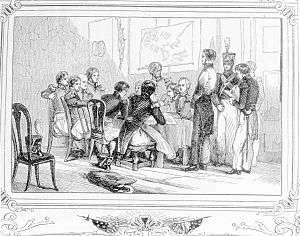Arbuthnot and Ambrister incident

The Arbuthnot and Ambrister incident occurred in 1818 during the First Seminole War. American General Andrew Jackson invaded Spanish Florida and captured and executed Alexander George Arbuthnot and Robert C. Ambrister, two British subjects charged with aiding Seminole and Creek Indians against the United States. Arbuthnot and Armbrister were tried and executed in Bay County, Florida near what continues to be called Court Martial Lake. Jackson's actions triggered short-lived protests from the British and Spanish governments and an investigation by the United States Congress. Congressional reports found fault with Jackson's handling of the trial and execution of Arbuthnot and Armbrister, but Congress chose not to censure the popular general.
Robert Chrystie Armbrister (1797–1818) was a British subject and a native of Nassau in the Bahamas. Armbrister was the youngest son of the South Carolina-born Loyalist, James Armbrister (1757/58-1833), who was then a lieutenant colonel in the colonial militia of the Bahamas. Son Robert had served in the British Royal Navy as a volunteer and as a midshipman between 1809 and 1813, when he returned to the Bahamas. During 1814-1815, he served in the Spanish Floridas as an auxiliary 2nd lieutenant of the British Corps of Colonial Marines, commanded by Brevet Major Edward Nicolls of the Royal Marines.[1][2] Discharged from the military in Nassau in 1815,[3][4] the former Marine lieutenant returned to Spanish Florida in 1817 with his fellow former Marine, Captain George Woodbine, and the Scottish soldier of fortune Gregor MacGregor.[5]
Alexander (George) Arbuthnot (born in Montrose, Scotland, in 1748) was an older man, a Scottish merchant, translator, and diplomatic go-between, on occasion, who had been present in the Floridas since 1803.[6] The executions of Arbuthnot, Armbrister, and at least two prominent Creek-Seminole leaders upon the demonstrated instructions of General Andrew Jackson, was perceived as an act of barbarity outside the existing conventions of warfare, both in Great Britain and elsewhere beyond the confines of the United States.[7]
References
- ↑ Niles' weekly register, Baltimore, Oct.3,1818,No.6-Vol.XV, pp 84-86.
- ↑ British and foreign state papers Volume 6, pg 434 Ambrister's Commission 'Whereas, I have thought fit to send a Detachment of the Royal Marine Corps to the Creek Nations, for the purpose of training to arms, such Indians and others as may be friendly to, and willing to fight under, the Standard of His Majesty: I ..appoint you as an Auxiliary Second Lieutenant, of such Corps of Colonial Marines...Given under my hand and seal, at Bermuda, this 25th day of July, 1814'
- ↑ British and foreign state papers Volume 6, p. 483, Memorial to R C Ambrister mentions that he and Nicolls sailed 'to Apalachicola, from whence he proceeded to the Creek Nation, where he served until those Forces were disbanded, upon the termination of hostilities with the Americans, when he returned to the said island of New Providence' and disembarked there from the Carron on 6 May 1815
- ↑ "Royal Marines on the Gulf Coast". Retrieved 19 January 2014.
Extracted information from the muster of HMS Carron
- ↑ The Florida Historical Quarterly, Vol. 23, No.1 (July 1944), pp. 39-44
- ↑ Arbuthnot and Ambrister incident Summary/bookrags.com
- ↑ Niles' weekly register, Baltimore, October 3, 1818, No. 6, Vol. XV, pp. 84-86
Further reading
- Aubigné, Guillaume Merle d'; Chinard, Gilbert. 1935. La vie américaine de Guillaume Merle d'Aubigné; extraits de son journal de voyage et de sa correspondence inédite, 1809-1817, Paris, E. Droz; Baltimore, Johns Hopkins Press. OCLC 1862429 - pp. 133–147.
- Gales, Joseph. 1834-1856. The debates and proceedings in the Congress of the United States; with an appendix containing important state papers and public documents, and all the laws of a public nature; Washington, Gales and Seaton. OCLC 10329123 - "Seminole War", pp. 367–374.
- Fisher, Louis. "Military Tribunals: Historical Patterns and Lessons". Congressional Research Service Report for Congress, 2004.
- Foreign Office. British and foreign state papers Volume 6, 1818-1819. Piccadilly, London: James Ridgway, 1835.
- Heidler, David and Jeanne Heidler. Old Hickory's War: Andrew Jackson and the Quest for Empire. Mechanicsburg, Pennsylvania: Stackpole Books, 1996. ISBN 0-8117-0113-1.
- Hoefer, Jean Chrétien Ferdinand. 1862. Nouvelle biographie générale depuis les temps les plus reculés jusqu'à nos jours, Paris : Didot. OCLC 73261929 - pp. 153–154
- Narrative of a voyage to the Spanish Main in the ship "Two Friends;" the occupation of Amelia island by McGregor, etc.--sketches of the province of East Florida; and anecdotes illustrative of the habits and manners of the Seminole Indians: with an appendix containing a detail of the Seminole war, and the execution of Arbuthnot and Ambrister, London, Printed for J. Miller, 1819. OCLC 16068670 - pp. 196–312.
- Remini, Robert V. Andrew Jackson and his Indian Wars. New York: Viking, 2001. ISBN 0-670-91025-2.
- Rush, Richard. 1845. Memoranda of a residence at the court of London comprising incidents official and personal from 1819-1825, including negotiations on the Oregon question, and other unsettled questions between the United States and Great Britain, Philadelphia : Lea & Blanchard. OCLC 12492949 - Chapters iv & v.
- Wright, J. Leitch, Jr. "A Note on the First Seminole War as Seen by the Indians, Negroes, and Their British Advisers". The Journal of Southern History 34, no. 4 (November 1968), 565-575.